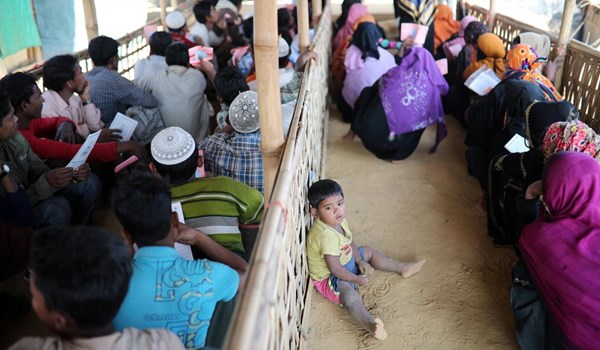
RNA - Dozens of refugees stood holding cloth banners opposing their transfer as United Nations Special Rapporteur Yanghee Lee visited camps along the Bangladesh-Myanmar border over the weekend, Reuters reported.
Some refugee leaders said Bangladesh military officials had threatened to seize their food ration cards if they did not return.
Rashedul Hasan, a Spokesman for the Bangladesh army, said he was not aware of army men threatening to take away food cards.
The refugees refuse to go back unless their safety can be guaranteed and Myanmars grant their demands to be given citizenship and inclusion in a list of recognized ethnic minorities. They are also asking that their homes, mosques and schools that were burned down or damaged in the military operation be rebuilt.
The refugees, living in overcrowded and squalid camps in Southeastern Bangladesh, had also staged the protest on Friday, declaring that they did not want to be returned. Chanting slogans and holding banners, the Muslim refugees demanded citizenship and guarantees of security before they would return to their home state of Rakhine in Myanmar.
Bangladesh and Myanmar agreed to repatriate the hundreds of thousands of Rohingya Muslims who have fled a recent army crackdown in Myanmar within a period of two years.
The United Nations refugee agency stressed that Rohingya Muslim refugees in Bangladesh should be consulted and ensured of their safety before they are repatriated to Myanmar’s Rakhine state.
Concerns are growing among United Nations agencies and humanitarian groups over an agreement between the Bangladesh and Myanmar governments to repatriate several hundred thousand Rohingya refugees within two years.
The UN secretary general, Antonio Guterres, said the repatriation deal needed to clarify whether Rohingya would be permitted to return to their homes or live in specially built camps.
“The worst would be to move these people from camps in Bangladesh to camps in Myanmar,” Guterres stressed.
The deal included no role for the UN refugee agency, he added, making it difficult to “guarantee that the operation abides by international standards.”
Amnesty International described plans to return the Rohingya refugees in Bangladesh as “alarmingly premature.”
More than 655,000 of Myanmar's Muslim minority have fled across the border to Bangladesh since late August when the Myanmar army launched a sweeping crackdown on Rohingya Muslims in Northern Rakhine state.
The UN has already described the Rohingya as the most persecuted community in the world, calling the situation in Rakhine similar to “a textbook example of ethnic cleansing.”
The Myanmarese government, however, denies committing atrocities against the Rohingya people and has even rejected UN criticism for its “politicization and partiality.”
UN High Commissioner for Human Rights Zeid Ra‘ad al-Hussein stressed that attacks on the Rohingya had been “well thought out and planned” and he had asked Myanmar’s de facto leader to do more to stop the military atrocities.
847/940